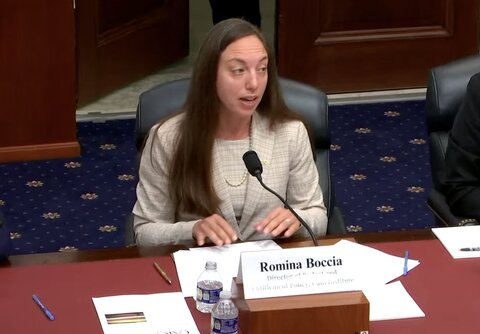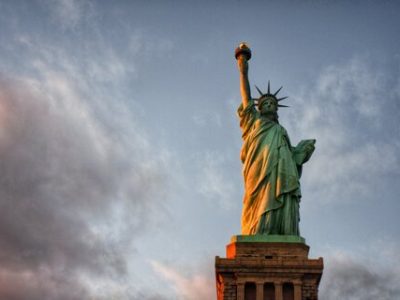
The Florida Department of Health has sent a letter to Gainesville television station WCJB demanding that it cease airing a campaign ad in support of Amendment 4, a ballot initiative that would liberalize the state’s abortion law.
In the ad, “Caroline” from Tampa states that undergoing an abortion was necessary to save her life and that “Florida has now banned abortion even in cases like mine.” The state health department claims that this is an incorrect statement about the current state of Florida law, that the error might cause some women not to seek needed medical treatment in Florida, and that as a result running the ad violates Florida Statutes section 386.01, under which “the commission of any act, by an individual, municipality, organization, or corporation … by which the health or life of an individual, or the health or lives of individuals, may be threatened or impaired” constitutes a ‘sanitary nuisance.’ ”
Under Florida law, the letter says, anyone who refuses to abate a sanitary nuisance on demand—in this case by taking the ad off the air—violates criminal law and is also subject to an injunction. Anticipating the objection that the First Amendment (and the parallel clause of the Florida constitution) covers campaign speech and this ad in particular, the Florida health department adds that such a right of speech “does not include free rein to disseminate false advertisements which, if believed, would likely have a detrimental effect on the lives and health of pregnant women in Florida.”
It seems hard to believe that either the federal or state courts would uphold the Florida Department of Health’s assertion here of an extraordinarily broad censorship power over speech about controversial public health matters, “sanitary nuisance” or otherwise.
To begin with, contemporary Supreme Court jurisprudence makes it clear that the First Amendment protects a wide range of untruths in public discourse. (I’ll assume for the sake of argument that Florida is right about the ad containing misstatements.) While the Supreme Court has not been unanimous as to exactly where the First Amendment line should be drawn, justices have agreed that the broadest protection applies to allegedly false speech about matters of wide public concern and debate, as here. (Eugene Volokh has more on US v. Alvarez and related cases.)
There are exceptions, but none apply here. Speech about health matters in a commercial or remunerated context can be subject to legal sanction, as with misrepresentation in a drug advertisement or medical advice by a doctor to a patient that constitutes malpractice. This speech, however, is intended to persuade listeners to vote a certain way, not to buy a patent medicine. As three justices put it in Alvarez, “The point is not that there is no such thing as truth or falsity in [areas of public concern and debate] or that the truth is always impossible to ascertain, but rather that it is perilous to permit the state to be the arbiter of truth.”
Likewise, while broadcasters come under some distinctive federal-level legal obligations, Florida does not assert a violation of this sort, nor would it have the power to enforce federal regulations in any event. Under Florida’s theory, the state could suppress the speech even were it made in a newspaper or social media posting. And while some states continue to have laws on the books prohibiting lies during campaigns—again, not relied on by Florida in this case—the enforceability of such laws is in doubt, most especially in the case of speech about ballot measures as opposed to, say, defamatory speech about a candidate.
I remember some on the Right arguing passionately, and I think correctly, that the First Amendment does not permit the government to suppress or censor false claims about COVID-19, even if (for example) those misstatements dissuade persons from resorting to life-saving vaccines or therapies. Indeed, in the Supreme Court case of Murthy v. Missouri (which was resolved on other grounds) the state of Florida joined an amicus brief strongly endorsing the principle that the First Amendment protects a right to say things about health that authorities consider mistaken and practically dangerous. What happened?










